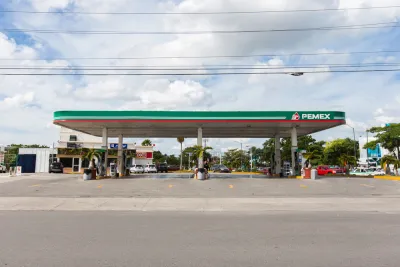Mexico began deregulation of gasoline prices to the dismay of motorists, as gas prices jumped about 20 percent on New Year's Day. People are so upset that pundits suggest the decision may imperil President Enrique Peña Nieto's re-election next year.

"Mexican motorists awoke to a shock as gasoline prices at the pump shot up by more than 20 percent in some corners of the country on the first day of the year, sparking panic buying, street protests and even a call by one prominent lawmaker for a 'peaceful revolution'," reports David Agren for The Washington Post.
Regular gas is scheduled to sell for 15.99 pesos per liter in Mexico City (about $2.85 per gallon), though prices will vary across the country.
That's over 20 percent higher that U.S. gas prices which averaged $2.353 on Jan.4, according to AAA. However, gasoline prices in Mexico are set by government for historic reasons, explains Agren.
Mexicans have long been used to low prices at the pump. Mexico expropriated the country's oil industry in 1938 and kicked out foreign oil companies, a move celebrated by Mexicans as a seminal act of sovereignty. Most Mexicans associate its nationalized oil industry with cheap gas.
However, Mexico now imports about half the gasoline it consumes. In a separate article, Maria Verza of the Associated Press reports on what Jorge Pinon, an energy expert at the University of Texas, Austin, described as "a total collapse of the refining system of Pemex."
The deregulation was prompted by budgetary reasons resulting from low oil prices. When oil prices were higher, the government would subsidize gas prices, which Mexicans had grown accustomed, notwithstanding some criticism.
"Some even pointed to the unfairness of the subsidies — which totaled approximately $20 billion in 2008 — saying the government spends more on cheap fuel for rich motorists (who collected much of the money) than on the budget for the National Autonomous University of Mexico," notes Agren.
This is not the first major energy change instituted by President Enrique Peña Nieto who proposed energy reforms in 2013 that allowed foreign investment in its state-owned oil company, Pemex for the first time since the expropriation in 1938. More recently, Planetizen correspondent Elana Eden reported on a carbon pricing demonstration project that was scheduled to begin in November 2016 "before launching a national carbon market in 2018."
FULL STORY: Mexicans are outraged over a big hike in gas prices on Jan. 1

Analysis: Cybertruck Fatality Rate Far Exceeds That of Ford Pinto
The Tesla Cybertruck was recalled seven times last year.

National Parks Layoffs Will Cause Communities to Lose Billions
Thousands of essential park workers were laid off this week, just before the busy spring break season.

Retro-silient?: America’s First “Eco-burb,” The Woodlands Turns 50
A master-planned community north of Houston offers lessons on green infrastructure and resilient design, but falls short of its founder’s lofty affordability and walkability goals.

Test News Post 1
This is a summary

Analysis: Cybertruck Fatality Rate Far Exceeds That of Ford Pinto
The Tesla Cybertruck was recalled seven times last year.

Test News Headline 46
Test for the image on the front page.
Urban Design for Planners 1: Software Tools
This six-course series explores essential urban design concepts using open source software and equips planners with the tools they need to participate fully in the urban design process.
Planning for Universal Design
Learn the tools for implementing Universal Design in planning regulations.
EMC Planning Group, Inc.
Planetizen
Planetizen
Mpact (formerly Rail~Volution)
Great Falls Development Authority, Inc.
HUDs Office of Policy Development and Research
NYU Wagner Graduate School of Public Service

























